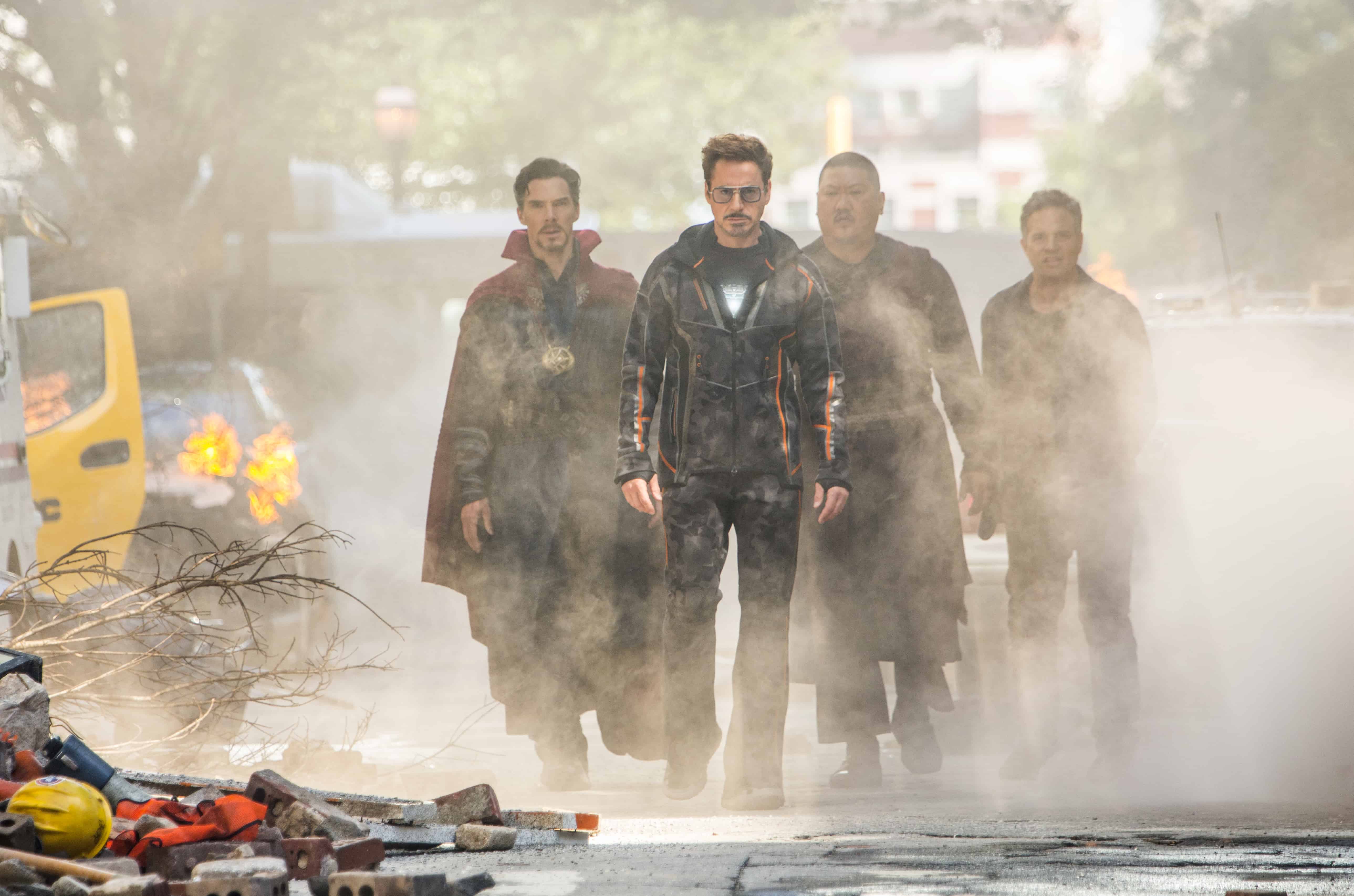More Than Just “A Snap” of a Problem:
When Thanos raised his hand and snapped, the feeling in the theater was palpable. A gasp here and there, a mumbled “no”, disbelief and horror, and then the goodbyes. Half the Marvel cinematic universe annihilated—cue the ominous music and roll credits of stoic white on a black backdrop.
If you saw Avengers: Infinity War, you probably left the theater wondering: How will the heroes win in the end? How will they defeat Thanos? What will happen in Avengers 4?
While these are interesting questions, there is a more fundamental problem haunting the Marvel universe: Where does Marvel go from here?
Since Iron Man (2008), Marvel has been systematically creating an integrated universe of over 20 movies and countless television shows and miniseries. The cinematic achievement is worth noting in its sheer breadth, but perhaps more notable is that all of these movies, Netflix miniseries, and television shows have occurred in a single, unified reality.1 There is a fullness to the storytelling—the television shows reference companies, events, and even people from the movies. 2 Yet, the relationship is also reversed: the movies also rely upon the television shows. 3 It’s beautiful storytelling, intricate and complicated, but Thanos’s “snap” in Avengers: Infinity War problematizes everything.
Snappy Clues to Stakes & Solutions:
In such an interconnected and interwoven story, how can Marvel write its way out of a seemingly impossible corner? In classic Marvel fashion, they are playing their cards close to the chest. All we have are whispers in terms of answers. 4 Yet, there are a few things which we do know…
First of all, Marvel has stated that the television shows and miniseries will not be directly affected by the storyline in Infinity War. This is not to say that their storylines will not reflect the events, but rather that we will probably not see an Agents of Shield or Jessica Jones or other television show with only half the cast present.
Second, the snap must not be permanent. Marvel currently has a dozen upcoming movies scheduled which would carry the franchise through the summer of 2022. Many of the projects in production involve characters who have “died” in Thanos’s victory. The social and commercial success of Black Panther alone suggests that Marvel is not likely to abandon the Black Panther or other beloved characters so easily. Though, admittedly, the Russo brothers and Marvel have claimed that some of the deaths within Infinity War were in fact genuine. Perhaps the pre-snap deaths were permanent, or the scheduled movies will be prequels to Infinity War and the snap. Unfortunately, we won’t know until the release of the Avengers 4 in 2019.
Third, Marvel’s Avengers: Infinity War is probably more akin to chess than checkers. As Dr. Strange claims as he dies in the film, “This was the only way.” His line references his use of the Time Stone to view all possible future outcomes of their battles with Thanos—of the millions of outcomes, only one results in their victory. Why does this matter? If they needed “to lose” in order to eventually win, then the Avengers 3 (2018) and Avengers 4 (2019) should be viewed together as a single story.5 Therefore, everything that happens between this year’s release of Avengers: Infinity War and the yet unnamed Avengers 4 title—aka: the other Marvel television shows and miniseries—might actually occur after the resolution of the Infinity War storyline.
So, How Could Marvel “Save” Its Interconnected Universe?
There are a few possible ways for them to save their complicated universe after Thanos’s snap, but the ones listed here rely upon a fundamental assumption: Avengers 3 & 4 are a single story.
1. Go Micro: Marvel’s Luke Cage Season 2 Approach.
The June release of Marvel’s Luke Cage on Netflix takes a unique approach to addressing a possible inconsistency between the series and the snap: no reference to the timeline/events of Infinity War appears. One explanation for this strange omission lies in the nature of the series itself, which is micro-focused on a single neighborhood, Harlem.
Another possible explanation relates to timing: either Luke Cage: Season 2 occurred in-full before Infinity War, or the season occurs after the Avengers complete their complicated chess-game against Thanos. Either way, Marvel can preserve the interconnected universe without creating paradoxes and inconsistencies by focusing the individual movie or series into the micro-level of story. By taking a close look at a single neighborhood or single conflict, a series or movie can avoid clashing with the larger action of the Avengers in the Marvel universe.
2. Treat Avengers 3 & 4 as a single, continuous moment in 2018.
Similar to the micro-approach, Marvel could in fact treat Avengers 3 & 4 as a single, continuous event sequence. If this is the case, then the release of everything after Avengers: Infinity War (April 2018) would actually occur after Avengers 4. This would mean that even though Avengers 4 will be released in May of 2019, the events of the movie will have actually concluded in 2018.
Marvel’s Agents of Shield seems to have taken this approach, as Avengers: Infinity War was released just before the last few episodes of the most recent season. The events in New York at the start of Infinity War are referenced in the television series, and Thanos is actually one of the motivations for the villain to consume an element which will heighten his power. Yet, by the end of the season, the urgency shifts away from the events occuring in Wakanda (the battle with Thanos and his eventual victory) which seems to imply that the whole of Thanos-Avengers conflict must have been resolved. While this creates a bit of a complicated assumption on timeline, it makes sense. Though it occurs in 2018, the season-five finale of Marvel’s Agents of Shield seemingly concludes after the Avengers 4 movie which will be released in a little less than a year from now.
This approach—treating Avengers 3 & 4 as a single, continuous story—appears in Ant Man & The Wasp which was released this July. In the “extra scenes” of which Marvel is so fond, we see Ant Man (Paul Rudd) trapped in the Quantum Realm because the snap. This means that the events of Ant Man and The Wasp occur just before Avengers: Infinity War, but the additional scene occurs simultaneously—ending with the snap which traps Ant Man. Perhaps, this means that Ant Man and The Wasp acts as a bridge between Infinity War (April 2018) and Avengers 4 (May 2019). This bridge would connect Captain Marvel (March 2019) who is rumored also to be trapped in the Quantum Realm to the larger Thanos-Avengers conflict. In other words, despite seemingly focusing on its own micro-story, Ant Man and The Wasp lays the next chess moves in the grand scheme to defeat Thanos.
3. What NOT to do: Undo the Snap—Pretending It Never Happened.
Despite the desire to see Spider-man, Black Panther, and Dr. Strange back in action, perhaps the worst possible thing Marvel could do with the snap is entirely backtrack. Avengers 4 will inevitably give us “the only way” to defeat Thanos. But if it does so by undoing the events of the first movie, then it does so at too high a cost to the complicated universe they have constructed. That is not to say that Avengers 4 should not bring back those whom the snap killed—or perhaps re-set events in motion to avoid the snap altogether—but if it does so without cost then the effect is to simply erase the events of Avengers 3 & 4.
So, where does Marvel go from here? Pretending the events never happened would unravel the tight writing of their interconnected stories. At least until this point, Marvel has avoided such a sloppy outcome in their meticulously-constructed cinematic universe.
Instead, the best option is to allow a tragic sacrifice to factor into overcoming Thanos. At least one of the remaining Avengers (and preferably more than one to match the sheer scale of Infinity War) needs to pay the ultimate price to undo the snap. That sacrifice should be something which ripples out into the Marvel universe affecting all the movies, Netflix mini-series, and television shows in that intricate, interwoven storytelling.
-//-
The cover photo is featured courtesy of the Catholic News Service.
- Note: Until recently, the Marvel characters were owned by multiple companies: 20th Century Fox, Sony, Disney/Marvel, & Universal. As such, there are several Marvel characters/series which are not (yet) attached to this larger cinematic universe that Marvel has been constructing. E.G. Some of the earlier Spider-Man movies, along with the X-Men and Deadpool movies, occur outside of cinematic universe referenced here. ↩
- A couple examples: Iron Man II’s villain owns a corporation which provides the weaponry in Marvel’s Luke Cage… In the first season of Marvel’s Agents of Shield, the agents spend an episode cleaning London after the events in Thor: The Dark World. ↩
- For example: Marvel’s Agents of Shield provides the storytelling buildup to the battle that opens Avengers: Age of Ultron; similarly, Agents of Shield provides insight into the political discussions which eventually brought about the “Sokovia Accords” which required the registration of all superheroes in Captain America: Civil War. ↩
- Marvel and the Russo brothers went so far to avoid spoilers in Avengers: Infinity War that they distributed fake scripts to their actors. They even wrote to the fans begging them to avoid spoilers. And, they assigned different cast members to interview in pairs, so that the more loose-lipped actors might have a little help in keeping the movie’s secrets—Poor Tom Holland (Spider-Man) notoriously was given several false scripts, and he even had to interview with Benedict Cumberbatch as his babysitter to stop him from spoiling the movie. ↩
- As a possible indication of this, one of the strongly rumored titles for Avengers 4 is Avengers: End Game. ↩


